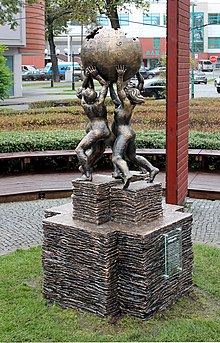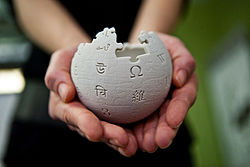User:T Cells/Yoruba Wikipedia video campaign
-
Yoruba Wikipedia promotion video shorter version.webm"
-
"Yoruba Wikipedia promotion video 5 mins version"
Project scope
[edit] Yoruba Wikipedia video campaign |
|---|
|
Project pages |
|
|
Yoruba is an African language spoken by over 41 million people in Nigeria, 1.7 million people in Benin Republic, 469,000 people in Ghana, and more than 120,000 people in Ivory Cost. It's a language taught in schools in Nigeria at all grade levels (primary, secondary, tertiary). In spite of this, many native speakers, students, and teachers are not aware that the Yoruba Wikipedia exists. This lack of awareness has resulted in low readership and few contributors. This project aims at creating an awareness video to promote the Yoruba Wikipedia.
Problems
[edit]The promotion video aims at significantly addressing and solving the following problems:
- Low awareness about the Yoruba Wikipedia - Yoruba language is a language taught in schools (at all level) in Nigeria. In spite of this, many native speakers, students, and teachers are not aware that Yoruba Wikipedia exists.
- Poor readership - There is no way people can read what they don't even know exists. The higher the awareness, the higher the readership level.
- Low number of editors - There is urgent need to recruit more contributing volunteer editors for the Yoruba Wikipedia. People could join the project as the level of awareness increases.
Solution
[edit]A short documentary video (2 min - 5 min) would be created and promoted among native speakers of the Yoruba languages. There would be a Facebook and a Twitter ad to promote the viewership. The video would be published on Wikimedia Commons as this would be useful for other users in creating a similar video. At the end of the project, the following would be achieved:
- At least 10,000 views in Twitter and Facebook for the video.
- 25% increase of new editors on Yoruba Wikipedia.
- 25% increase of site views. This tool would be used to measure the increase in site-views.
- At least 3 people contributed to the video production.
Work plan and timeline
[edit]| Work plan & timeline | |||||||
|---|---|---|---|---|---|---|---|
| Month(s) | Location(s) | Activities | Resulting deliverables | Remarks | |||
| 28 February – 7 March 2021 | Lagos & Ibadan | Production meetings, script writing, shoot days scheduling, tickets & travel bookings | Every arrangement will have been finalized | ||||
| 8 – 13 March 2021 | Ibadan & Abeokuta | Video production (shooting) & post-production (editing, color correction, sound mixing, subtitling; etc.) | One quality video produced (2–5 mins). | ||||
| 18 March 2021 | Lagos | Uploads to Commons | The video is uploaded to Commons | ||||
| 18 – 26 March 2021 | Lagos | Video promotion on social media and among community members | Video promoted | ||||
| 25 March 2021 | Lagos | Reporting | Report draft published on Meta-Wiki | ||||
| 26 March 2021 | Lagos | Finalization of report | Final report is submitted to the Wikimedia Foundation | ||||
| 27 March – 15 April 2021 | Lagos | Working with Chris Koerner
(Community Relations Specialist, Wikimedia Foundation) on a blog post for publication on Diff |
Publishing a blog post on Diff (blog) | ||||
Communication plan
[edit]Effective communication is a key factor in documentary production. Below are the various types of communication we had and its objectives
| Communication type | Objectives of communication | Medium | Frequency | Audience | Owner |
|---|---|---|---|---|---|
| Production meeting |
|
In-person | one-off |
|
Project manager (Isaac Olatunde) |
| Post-production meeting |
|
In-person | one-off |
|
Project manager (Isaac Olatunde) |
| Video Licensing |
|
In-person | one-off |
|
Project manager (Isaac Olatunde) |
Deliverables
[edit]| Deliverables | |||||||
|---|---|---|---|---|---|---|---|
| File type | No. of files | Format | Duration | Approximate size on GB or TB | |||
| Video | 1 | WebM or .ogg | 2 – 5 mins | 20 MB | |||
Script
[edit]Script outline
[edit]Scene 1
The video begins with a panoramic view of Ibadan, the capital of Oyo State and the third-largest city in Nigeria, accompanied by a talking drum. (13 sec) This is followed by a voice-over narrating the importance of the Yoruba language, the people, and the parts of the world where the language is not as an official language but has a large number of speakers. (13 sec.)
Visual graphics
Panoramic view of the ancient town of Ibadan, featuring the Layipo Tower, Cocoa House, and Opic Tower. Panoramic view of Abeokuta, featuring the new Abeokuta Bridge.
Sound
Yoruba talking drums
Text
My language, my heritage.
Voice-over
The Yoruba race, particularly the language, is prominent and spoken across the world. The Yoruba language is spoken not only in Nigeria but also in other countries such as Togo, Republic of Benin, Ghana, Bayen, and Brazil to mention a few. (19 seconds)
Visual graphics

A group of Yoruba Dancers from Osun State, Nigeria, in their traditional "Adire" attire. Local talking drums workshop, Nigerian flag, the flags of Togo, Brazil, and the Republic of Benin.
Scene 2
Tunde Kelani Interview

73-year-old Tunde Kelani sits on a couch in his home in Abeokuta, Ogun State, Nigeria. He wears a Yoruba cap called a fila on a blue dansiki cloth styled with local weavings, and has a laptop computer in front of him.
Text
Some hidden qualities of the Yoruba are our origin and language. The total number of Yoruba speakers is more than 40 million, aside from speakers in diasporas including the Republic of Benin, Togo, and Ghana. This serves as an opportunity for Yoruba to develop and increase our understanding of the language by knowing our history because this will serve as a catalyst for growth and advancement. There are documentation on Yoruba language but it's important to find an effective way of sharing it with the next generation Yoruba Wikipedia is a platform where this knowledge can be shared for people to have unrestricted access and the Yoruba Wikipedia is easily accessible. (1 min, 15 sec)
Visual graphics
Yoruba local dancers, Agbada and fila in a museum, group photos of the Yoruba language students, and teachers, the flag of Togo flags, Brazil and the Republic of Benin.
Voice-over
One of the important ways to improve and promote the use of Yoruba language as a tool for economic growth is through reading and research and this is the privilege's that Yoruba Wikipedia has provided. (19 seconds)
Visual graphics
Image showing a person reading Yoruba language, the image of Professor Wole Soyinka, the late Professor Akinwunmi Ishola, Professor Adebayo Faleti, and image of a local chiefs, photo of a Yoruba stage play performance, old Yoruba books used in teaching in schools and group photos of Yoruba students in Adire attire with other local items such as shekere, ileke, apere, igba, etc.
Scene 3
Joke Muyiwa interview
The award-winning Yoruba film actress sits on a couch in her home in Ibadan, Oyo State, Nigeria. She wears a red Yoruba gele on a yellow gown with a necklace of the local bead called Ileke.
Text
Yoruba Wikipedia is a platform for learning and research and serve as a platforms for knowledge sharing. You know that if you need any information about a country or event for example, you can find it on Wikipedia and that serves as a useful resources for us. The Yoruba Wikipedia gives opportunity to native speakers of Yoruba language who do not have a good understanding of the English language to access information in their preferred language. Yoruba Wikipedia provides a platform for us to learn more about our history, culture and our ancestors. (1 min: 1 seconds)
Visual graphics

Mihran Hakobyan's sculpture 'Pomnik Wikipedii', located in Słubice, Poland Screenshot of Abraham Lincoln article on Yoruba Wikipedia, Group photo of the Yoruba Wikimedians User Group's training participants
Scene 4
Tunde Oladimeji interview
The multi-talented film actor, producer and documentarist wears a shirt and sits on a small chair in his garden in Ibadan.
Text
Yoruba Wikipedia provides a platform for us to learn about history, sociology and philosophy of the Yoruba race. The articles on Yoruba Wikipedia are useful,. Our mother's tongue is very important and reading articles on Yoruba Wikipedia will improve learning and understanding of Yoruba language. It would also boost our confidence and improve our knowledge of internet and media literacy and gives us the opportunity to read in our mother tongue on the internet. (45 seconds)
Visual graphics Screenshots of the Cocoa House and Ibadan articles on the Yoruba Wikipedia.
Scene 5
Tunde Kelani interview

Now, speakers of Yoruba language in Cuba, Brazil, and Togo can now access information in the Yoruba language on Wikipedia. It's important to create awareness about the Yoruba Wikipedia because people may not be aware that this language version of Wikipedia exists. I learned about the Yoruba Wikipedia recently. I visited the Yoruba Wikipedia and realized that many different topics have been covered. If other languages could thrive, it is imperative to make effort in digitizing the Yoruba language, particularly contributing to Yoruba Wikipedia so that we can be proud of our own language Wikipedia. (1 min, 12 sec)
Visual graphics
Image of a Yoruba stage play performance
Scene 6
Voice-over
You can join the Yoruba Wikipedia as a contributor or editor via the following steps: Click on yo.wikipedia.org. This will take you to the homepage of Yoruba Wikipedia, then click on "Create account" and register. (29 seconds)
Visual graphics
Mihran Hakobyan's sculpture 'Pomnik Wikipedii', located in Słubice, Poland, the screenshot of the homepage of Wikipedia, the registration interface, the mini-globe handheld design by David Peters for the Wikimedia Foundation
The video ends with the text "Yoruba Wikipedia documentary" "my language, my heritage" and talking drums sounds. (13 seconds)
Similar video to reuse
[edit]-
"Short documentary of Wikipedia in celebration of the Wikipedia 20th anniversary"
-
"Yoruba docuemntary showcasing the contributions of Yoruba Wikipedia to combating the COVID-19 pandemic"
- Social media promotion insight
| Promotion | Link | Reach | Views | Notes |
|---|---|---|---|---|
| Facebook promotion | Yoruba Wikipedia | 196K | 67K | Data generated from Facebook page insights. |
| Twitter promotion | Olatunde Isaac | 22.28K | 1.6K | Data generated from Twitter insight |
| Total reach ⥱ | 218.28K | Total views ⥱ | 68.6K | |
- Pageviews statistical analysis


| Project | Time period | Siteviews | Daily Average | Reference |
|---|---|---|---|---|
| Yoruba Wikipedia | February 28 - March 28 2021 | 1,544,124 | 57,756 | Pageviews Analysis - Toolforge |
